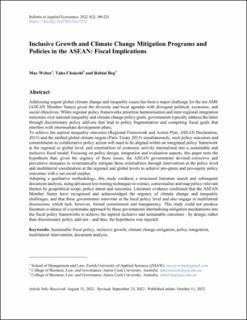Please use this identifier to cite or link to this item:
https://doi.org/10.21256/zhaw-27420| Publication type: | Article in scientific journal |
| Type of review: | Peer review (publication) |
| Title: | Inclusive growth and climate change mitigation programs and policies in the ASEAN : fiscal implications |
| Authors: | Weber, Max Chaiechi, Taha Beg, Rabiul |
| et. al: | No |
| DOI: | 10.47260/bae/9212 10.21256/zhaw-27420 |
| Published in: | Bulletin of Applied Economics |
| Volume(Issue): | 9 |
| Issue: | 2 |
| Page(s): | 189 |
| Pages to: | 221 |
| Issue Date: | 2022 |
| Publisher / Ed. Institution: | Scientific Press International |
| ISSN: | 2056-3728 2056-3736 |
| Language: | English |
| Subjects: | Sustainable fiscal policy; Inclusive growth; Climate change mitigation; Policy integration; Multilateral intervention; Document analysis |
| Subject (DDC): | 332: Financial economics 338.927: Environmental economics and sustainable development |
| Abstract: | Addressing urgent global climate change and inequality issues has been a major challenge for the ten AMS (ASEAN Member States) given the diversity and local agendas with divergent political, economic, and social objectives. While regional policy frameworks prioritise harmonisation and inter-regional integration outcomes over national inequality and climate change policy goals, governments typically address the latter through discretionary policy add-ons that lead to policy fragmentation and competing fiscal goals that interfere with intermediate development plans. To achieve the aspired inequality outcomes (Regional Framework and Action Plan, ASEAN Declaration, 2013) and the ratified global climate targets (Paris Treaty 2015) simultaneously, such policy outcomes and commitments to collaborative policy action will need to be aligned within an integrated policy framework at the regional or global level, and externalities of economic activity internalised into a sustainable and inclusive fiscal model. Focusing on policy design, integration and evaluation aspects, this paper tests the hypothesis that, given the urgency of these issues, the ASEAN governments devised corrective and preventive measures to systematically mitigate these externalities through intervention at the policy level and multilateral coordination at the regional and global levels to achieve pro-green and pro-equity policy outcomes with a net social surplus. Adopting a qualitative methodology, this study conducts a structured literature search and subsequent document analysis, using advanced text mining techniques to extract, contextualise and map policy-relevant themes by geopolitical scope, policy intent and outcomes. Literature evidence confirmed that the ASEAN Member States have recognised and acknowledged the urgency of climate change and inequality challenges, and that these governments intervene at the local policy level and also engage in multilateral discussions, which lack, however, formal commitment and transparency. This study could not produce literature evidence of a systematic approach by these governments internalising mitigation mechanisms into the fiscal policy frameworks to achieve the aspired inclusive and sustainable outcomes - by design, rather than discretionary policy add-ons - and thus, the hypothesis was rejected. |
| URI: | https://digitalcollection.zhaw.ch/handle/11475/27420 |
| Fulltext version: | Published version |
| License (according to publishing contract): | CC BY 4.0: Attribution 4.0 International |
| Departement: | School of Management and Law |
| Organisational Unit: | International Management Institute (IMI) |
| Appears in collections: | Publikationen School of Management and Law |
Files in This Item:
| File | Description | Size | Format | |
|---|---|---|---|---|
| 2022_Weber-etal_Inclusive-growth-climate-change-mitigation-programs-policies-ASEAN.pdf | 1.2 MB | Adobe PDF |  View/Open |
Show full item record
Weber, M., Chaiechi, T., & Beg, R. (2022). Inclusive growth and climate change mitigation programs and policies in the ASEAN : fiscal implications. Bulletin of Applied Economics, 9(2), 189–221. https://doi.org/10.47260/bae/9212
Weber, M., Chaiechi, T. and Beg, R. (2022) ‘Inclusive growth and climate change mitigation programs and policies in the ASEAN : fiscal implications’, Bulletin of Applied Economics, 9(2), pp. 189–221. Available at: https://doi.org/10.47260/bae/9212.
M. Weber, T. Chaiechi, and R. Beg, “Inclusive growth and climate change mitigation programs and policies in the ASEAN : fiscal implications,” Bulletin of Applied Economics, vol. 9, no. 2, pp. 189–221, 2022, doi: 10.47260/bae/9212.
WEBER, Max, Taha CHAIECHI und Rabiul BEG, 2022. Inclusive growth and climate change mitigation programs and policies in the ASEAN : fiscal implications. Bulletin of Applied Economics. 2022. Bd. 9, Nr. 2, S. 189–221. DOI 10.47260/bae/9212
Weber, Max, Taha Chaiechi, and Rabiul Beg. 2022. “Inclusive Growth and Climate Change Mitigation Programs and Policies in the ASEAN : Fiscal Implications.” Bulletin of Applied Economics 9 (2): 189–221. https://doi.org/10.47260/bae/9212.
Weber, Max, et al. “Inclusive Growth and Climate Change Mitigation Programs and Policies in the ASEAN : Fiscal Implications.” Bulletin of Applied Economics, vol. 9, no. 2, 2022, pp. 189–221, https://doi.org/10.47260/bae/9212.
Items in DSpace are protected by copyright, with all rights reserved, unless otherwise indicated.